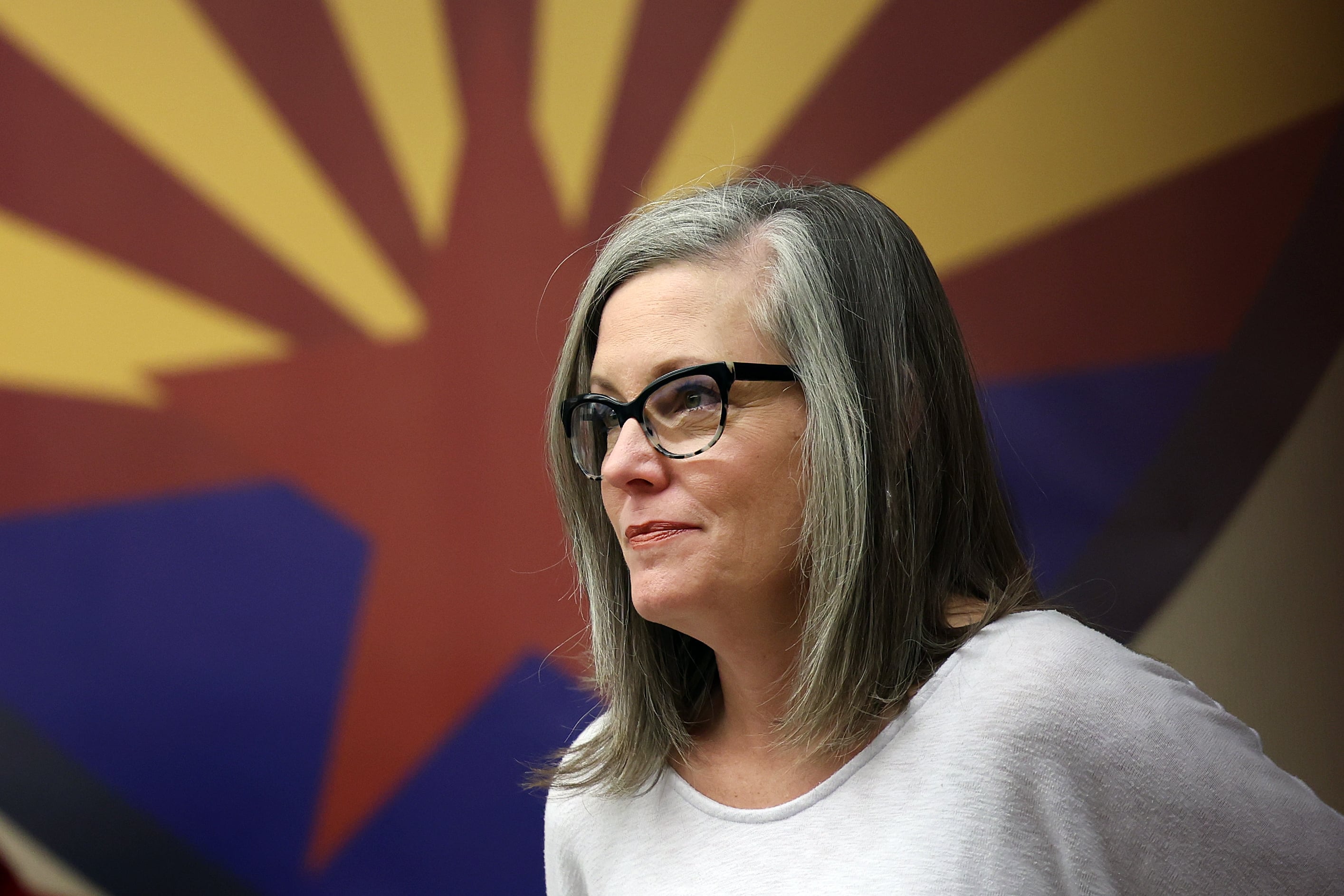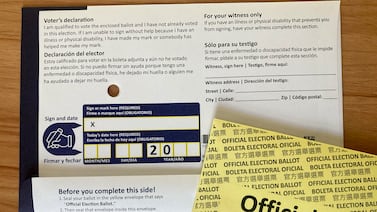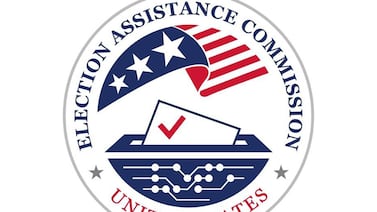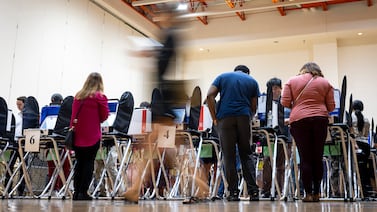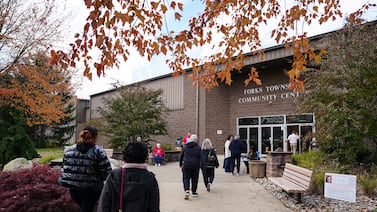Arizona officials certified the state’s midterm election results Monday after a tumultuous month of challenges to the certification process that was reminiscent of 2020 and potentially set the stage for 2024.
The certification is a milestone given the GOP’s pressure campaign demanding the election results be thrown out. But it in no way ends all possible fights over who won. Rather, it kicks off the five-day period in which lawsuits challenging the results can be filed in court and a long timeline for three statewide recounts, which are expected to stretch to the end of the month.
Secretary of State Katie Hobbs, a Democrat who was elected governor, signed off on the results at Monday’s ceremony, with the governor, attorney general, and chief justice of the Arizona Supreme Court as witnesses, as required by state law. The ceremony was closed to the public, as in 2020, mostly for security reasons, according to a Hobbs spokesperson. Before signing, Hobbs called the election transparent, accurate, and fair.
“Arizona had a successful election, but too often throughout the process, powerful voices proliferated misinformation that threatened to disenfranchise voters,” she said.
Hobbs sued Cochise County last week after Republican supervisors Peggy Judd and Tom Crosby refused to certify the election results by the Nov. 28 deadline. A judge on Thursday forced the board to certify, and two of the supervisors — Judd and her Democratic board colleague Ann English — complied within hours.
The efforts to disrupt this year’s election, Hobbs said Monday, was a precursor of more to come in 2024.
“Democracy prevailed, but it’s not out of the woods.” she said. Hobbs’ gubernatorial challenger Kari Lake has refused to concede and has said she plans to file a lawsuit challenging the results. Shortly after the certification ceremony Monday, Lake shared a video on Twitter of her during an interview with former Trump advisor Steve Bannon in which she called it a “sham election” and apparently referring to Maricopa County’s printer problems.
“We have a blatant sabotaging of Election Day, a disrespect, a disregard, a disenfranchisement of Election Day voters, and if they sit there and sign their names to this sham certification, history will never forgive them,” Lake said, apparently referring to Hobbs, Republican Gov. Doug Ducey, and Republican Attorney General Mark Brnovich.
Lake had called on Hobbs to recuse herself from certifying the election, saying that there was a conflict because of her run for governor. In an interview with Votebeat after the certification, Assistant Secretary of State Allie Bones said that there was no conflict. Incumbent secretaries of state have long certified their own elections in Arizona.
Bones said that it’s her hope that people who try to disrupt the elections will be held accountable, now and in the future. Hobbs wrote a letter to Attorney General Mark Brnovich last week asking him to bring criminal charges against the Cochise County supervisors for failing to certify their election.
“The only way to curb this type of behavior is to hold folks accountable,” Bones said. For example, Bones said the secretary’s office applauded a U.S. District Court judge who last week brought sanctions against Lake and Secretary of State candidate Mark Finchem for what the judge said was a frivolous lawsuit claiming the state’s vote-counting machines were inaccurate and insecure. She said the office hopes Brnovich will take the request to charge the Cochise supervisors seriously.
When Votebeat asked Brnovich’s office how he would respond to these letters, a spokesperson declined to comment.
Alex Gulotta, Arizona state director for voting rights advocacy group All Voting is Local, told Votebeat after the certification that the challenges to this election showed us where our system can break down, and where legal fixes might strengthen our election system.
“There might be ways that state law needs to be tightened up,” he said, “but also, for people who potentially violate the law, there should be consequences.”
Maricopa County printer problems lead to questions
Lake and other prominent Republicans in the state seized on the widespread ballot printing problems in Maricopa County on Election Day to spread doubt about the accuracy of this election and pressure county supervisors not to certify their elections. The problems in Maricopa County caused long lines at some vote centers and worried some in-person voters who weren’t able to watch their ballots tabulated on the spot, causing Lake and others to allege that voters had been disenfranchised.
A few weeks ago, Brnovich asked the county for information about its printer problems, claiming in the letter that the county broke the law when addressing the problem, including their process of checking voters out of a location that was experiencing problems so they could vote somewhere else. The county responded with a letter saying that it did not break the law and providing detailed data about voting patterns and information about processes, including how county officials decided when to count ballots that were cast by voters who went to two locations.
Brnovich, who is in his final year in office and lost his primary bid for U.S. Senate, has angered both sides of the fray over the last two years, launching investigations into Maricopa County’s election processes but so far failing to find widespread fraud or wrongdoing.
He continued to walk the line on Monday, making clear before signing off on the certification that he and Gov. Ducey were there “merely as witnesses.”
“The Attorney General’s participation in today’s canvass serves as neither an endorsement of the election results nor the lawfulness under which the election was conducted,” his office said in a statement shortly after.
On to the recounts
Before the midterm election is final, three races must be recounted under a new state law that narrowed the margin to trigger automatic recounts.
Falling within that margin for this election are the races for attorney general, superintendent of public instruction, and state representative in District 13, which represents parts of Chandler.
The difference in votes between the two candidates in those races is less than 0.5% of the total votes cast in the race. Previously, recounts were usually triggered by a margin less than 0.1%.
The first step is for Hobbs to ask the court to order the recounts, which her office said Monday night that she did.
Next, all of the vote-counting machines used in the election will need to be re-tested for accuracy. That will take a few days. Then, the counting can begin again.
Maricopa County’s elections director estimated that it would take the county about eight days to complete the first part of the recount, which involves re-running all ballots through the tabulation machines. Then, the counties will need to count by hand 2% of all the votes cast in these races, which is expected to take several additional days.
Strength of elections hinges on trust, accountability
The letter Hobbs sent Brnovich last week asking him to press criminal charges in Cochise echoed one sent by former Democratic Attorney General Terry Goddard and former Republican Maricopa County Attorney Rick Romley.
The former prosecutors told Brnovich and Cochise County Attorney Brian McIntyre that they “believe deeply that the rule of law dictates that public officials be held accountable when they refuse to comply with their legal obligations.”
“All the more so where those officials’ actions threaten to undo the proper administration and integrity of elections, disenfranchise thousands of voters and potentially even alter the results of some races,” they wrote.
Bones said moving forward, it’s going to be important to not only hold officials responsible, but also to rebuild trust among voters to undo the damage from misinformation.
“It’s going to require transparency and integrity from all in election administration going forward, but also some level of accountability from those who perpetuate these lies about the election,” she said.
Gulotta called on all elected officials across the state to stand up for our election system.
“The moderate voices in the aisle that have been effectively silent since 2020 need to regain their voice, speak out and say, ‘We need to follow the rule of law,’ ” he said.
Jen Fifield is a reporter for Votebeat based in Arizona. Contact Jen at jfifield@votebeat.org.


